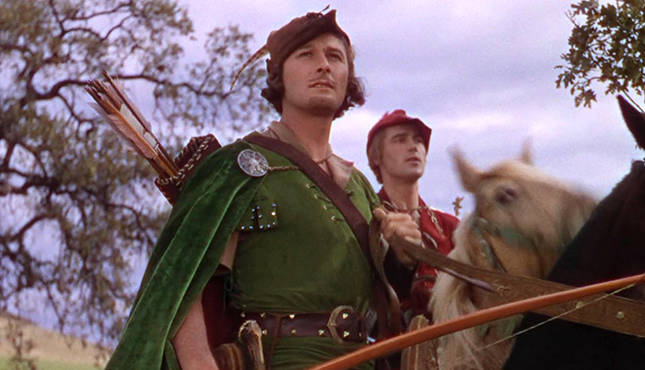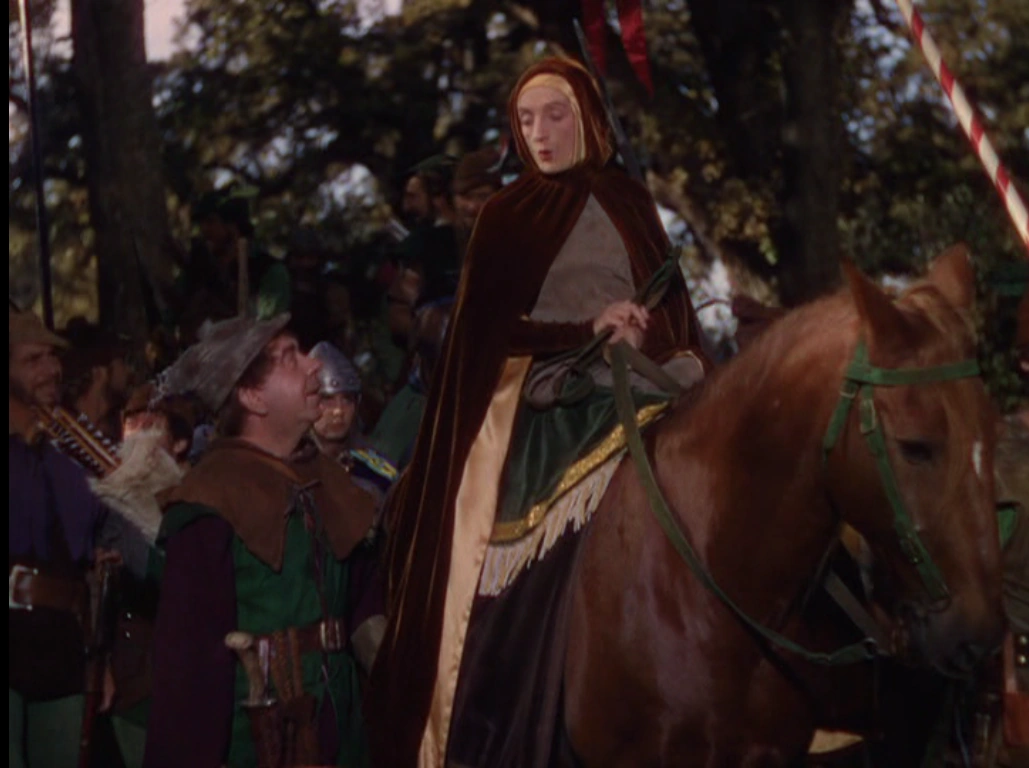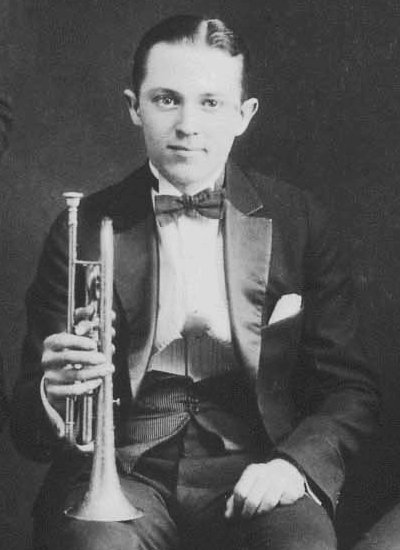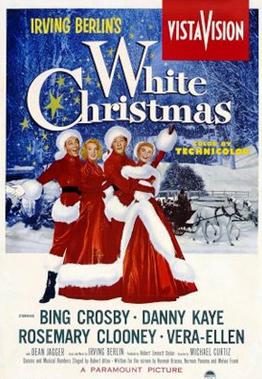CASABLANCA (1943)
A Perfect Film As Time Goes By...
I remember very well the first time I came across
Casablanca. I had heard much about
Casablanca and knew it by reputation. I decided to rent the VHS copy to see for myself what the big deal was about (I told you it was a long time ago). As I watched
Casablanca, I fell in love with it, completed my conversion to making film and/or film discussion a major part of my life, knew my life had been improved, and that I had seen perhaps the greatest film ever made.
Casablanca has achieved such a legendary status as this Icon of Film one sometimes is afraid to approach it as just good entertainment. However, one can easily forget "
The Legend" of
Casablanca and enjoy a film that has romance, drama, some action, and even a bit of comedy.
Let's go over the plot. Two German couriers, carrying letters of transit, have been murdered. Those letters will allow anyone in the French Moroccan city of Casablanca to leave the refugee-swarmed city, no questions asked. Now, who HAS those letters?
Rick Blaine (Humphrey Bogart) is the owner of Rick's Cafe Americain in Casablanca (Rick's Cafe...I like the sound of that). He's a cynical man (his motto being "I stick my neck out for no one"). Ugarte (Peter Lorre), a shady forger and criminal, informs Rick that he has those letters of transit and asks Rick to hold them for a few hours. Rick agrees, but Ugarte is arrested immediately after by orders of Nazi Major Strasser (Conrad Veidt) and the Prefect of Police of unoccupied France, Captain Louis Renault (Claude Rains).
Renault and Rick, who have a cordial relationship, strike a bet that one of the Third Reich's greatest enemies will be able to escape Strasser and go on to America. It is Resistance leader Victor Lazlo (Paul Henreid). Rick thinks he will, Renault says he simply can't. Complicating things for Lazlo is that he is travelling with a lady.
That lady is Ilsa Lund (Ingrid Bergman). We quickly discover that Ilsa and Rick had once been in love in Paris, but that she left him when the Nazis entered Paris, forcing a despondent, dejected Rick to flee. Embittered by his abandonment, Rick now faces the return of The One. Rick's friend and cafe bandleader Sam (Dooley Wilson) urges Rick to leave, but he won't.
Soon we learn Ilsa's secret: she is really Lazlo's wife.
Everyone is searching for those letters but no one knows where they are or who has them, or as Rick points out to his friendly business rival Ferrari (Sydney Greenstreet), "practically no one". Lazlo asks, and even Ilsa returns demanding Rick hand them over. Eventually she crumbles into his arms and tells him the whole story: she and Lazlo were secretly married but she thought Lazlo was dead when she and Rick began their romance only to discover he was alive right before Paris fell. She tells Rick to do the thinking for all of them to decide what best to do.
Rick eventually makes his decision, leading to Strasser's death, Lazlo escaping and Rick and Ilsa realizing that 'we'll always have Paris', but never Casablanca.
Casablanca ends with the renewed freedom fighter Rick and the newly principled Renault walking away with Rick observing, "Louie, I think this is the beginning of a beautiful friendship."
Casablanca on many levels shouldn't work, primarily in that the story as told doesn't make sense. Constant viewing (yes, I've lost track of the number of times I have seen it) allows for observation as to the things that are illogical or out of place. The biggest flaw involves the letters of transit. What we hear is that they are signed by General DeGaulle. If that is the case, why would the Nazi officials respect letters of transit signed by the enemy? Furthermore, it is highly unlikely that an anti-Nazi like Lazlo would be able to walk openly in front of Major Strasser while the collaborating Vichy regime simply did nothing. We even can observe continuity issues: for example, it's obvious that Wilson is NOT playing the piano (Wilson in real life didn't) and that the rain at the Paris train station suddenly stops when Sam and Rick get on the train.
These things one becomes aware of over time, but on first viewing one simply doesn't notice any of that. The credit goes all around, starting with director Michael Curtiz. He moves the story quickly, and one sees that the film flows so smoothly one quickly gets a great deal of information without stopping. Minus the newsreel-like opening that tells us about the plight of refugees and how they end up in Casablanca once the story starts it never loses momentum.
There are simply so many things that makes
Casablanca such a brilliant film. Curtiz set the mood so brilliantly with quick snippets. For example, when we first enter Rick's Cafe Americain the camera flows to hit various tables. We get quick bits showing the shady dealings and desperate plight of refugees without lingering long on them, but just enough to give us the atmosphere of the place.
An argument could be made that
Casablanca was pre-
film noir, with the lighting in particular.
Casablanca isn't a noir film, but we see touches of it.
Again and again Curtiz creates the atmosphere and mood without going into long exposition. He directs the scenes to tell us just what we need to know and nothing more.
When it comes to the performances, you simply have a brilliant cast that knew HOW to act. Let's start with Humphrey Bogart as the cynical Rick.
Casablanca was a complete change of pace for Bogart, for this is the first time he played a romantic lead. Known before this film as a tough guy,
Casablanca gave Bogart the chance to show he could play a man who used a cynical mask to hide a deeply vulnerable and hurt heart.
Bogart has a brilliant way with dialogue. Take a look early in the film when he puts down Yvonne (Madeliene LeBeau), a casual girlfriend:
Yvonne: Where were you last night?
Rick: That's so long ago I don't remember.
Yvonne: Will I see you tonight?
Rick: I never make plans that far ahead.
Again and again Bogart's delivery of his lines tell so much about Rick's cynicism and dark view of life. However, we also see the broken and hurt man behind the tough exterior. When Rick gives his "Of all the gin joints in all the town in all the world,
she walks into mine," monologue, you see in his performance the agony of seeing the woman he loved but who left him come back into his life again. His voice quivers when he tells Sam, "If she can stand it I can! Play it," betraying his emotions are finally overwhelming him and that he can't lie to himself about the pain he tries to deny.
Rick is hurt and angry and broken at being forced to deal with his love for Ilsa and her betrayal (from his perspective).
Casablanca hangs on what Rick does since he has the letters of transit everyone is after. We need to believe he doesn't care about anything or anyone, then we need to believe he loves Ilsa and then finally we need to believe he would sacrifice for her.
Bogart's performance goes through this evolution from cynic to, as Renault tells him, "not only are you a sentimentalist but you've also become a patriot", all while maintaining a touch of his cynical and sarcastic tone. When Renault basically congratulates him by saying he's a patriot, Rick's glib answer is, "Seemed like a good time to start." Bogart is simply brilliant as the man who loved, lost, and in the end won a moral victory by sacrificing himself for the greater good.
Then again, who wouldn't sacrifice everything for her? Ingrid Bergman to her dying day claimed to not understand what all the fuss over
Casablanca was about. She never thought it was one of her best films or her best performances. Even while making it Bergman felt that
Casablanca was holding her up from a more prestigious project: the film version of Ernest Hemingway's
For Whom the Bells Toll. In fact, she couldn't wait to finish
Casablanca to move on to
FWTBT, so much so that as soon as filming wrapped she cut her hair for her new part. This made retakes impossible, but it ended up being a blessing in disguise in that
Casablanca was now locked with not just her performance but also, curiously enough, with the music (more on that later).
Let's take Bergman at her word and assume she was basically sleepwalking through
Casablanca. If that's the case, then we see that Bergman even in her off days was simply more talented than most actresses are when they're on all cylinders. Ilsa's own hurt when Rick all but calls her a whore is agonizing, but she also projects warmth and strength when dealing with Rick or Lazlo or even Strasser.
Paul Henreid was not happy with the part of Lazlo and with good reason. His Lazlo is a man of high principles, so much so that he becomes such a stiff one wonders why exactly Ilsa would ever think her choice would be hard. However, even Henreid has his moment: when he leads the club band to play
La Marseillaise to drown out the Germans singing
Watch on the Rhine it becomes such an inspiring moment that only a leader like Victor Lazlo could get away with it and make it believable. That is a particularly powerful moment, so powerful that one imagines even devout Francophobes like Sean Hannity would cheer the French national anthem as a song of defiance against tyranny.
I confess to being biased when it comes to picking my favorite character and favorite performance in
Casablanca. I'm a hopeless Claude Rains fan, and Captain Renault is the perfect blend of comedy and sophistication. Throughout
Casablanca, Rains' Renault manages to play all sides, and one really never knows where he stands in regards to whom he favors: the Allies or the Axis. Even though he wasn't billed as one of the stars, it's obvious that Rains ran away with the film. That guessing game, along with his great rapport with Bogart's Rick, makes Captain Renault one of the most delightful characters in film: witty, devious, insincere to the Nth degree, but always with a bit of humor to the proceedings.
It also helps in my Renault-love that he has the best line in
Casablanca. For those who've never seen it, his reaction to being "shocked, SHOCKED" is both instantly recognizable (that line being one of many that has entered the popular lexicon) and just deliberately funny.
Here is where I'd like to segway a little into one of the best things about
Casablanca: the screenplay by twins Julius J. & Phillip G. Epstein and Howard Koch. Again and again there is so much subtext in the dialogue: while the characters may be saying one thing it's clear they mean something else. There are a wide variety of examples: when Rick mentions to Ugarte that he'd heard the two murdered couriers were carrying letters of transit, he doesn't flat-out say Ugarte killed them, but we figure that's what he meant. Before Ugarte is arrested, he asks the police, "May I first please cash my chips?" Subtle, don't you think?
It isn't just in the dialogue (even though it is brilliant) but also in what is implied. Major Strasser and his aide Colonel Heinz (Richard Ryen) are asking Rick about what he thinks of German invasions. Asked if he can imagine the Germans in London, Rick replies, "When you get there, ask me." When asked about New York, Rick tells Strasser that there are certain parts of New York he'd advise against invading. Later on, a drunk Rick asks Sam, "If it's December 1941 in Casablanca, what time is it in New York?" Sam's noncommital answer is that his watch's stopped. "I bet they're asleep in New York. I bet they're asleep all over America."
This can be read many ways. It may be referring to the peace of sleep Rick can't have because the woman he loved has suddenly appeared in his life again. It also plainly could be a reference to how America was 'asleep' to the Nazi/Axis threat. The genius of
Casablanca is that so much is being said without overtly being spoken.
Throughout the movie there are moments of wit, of humor, of romance lost, found, and redeemed without taking away from the overall story of people trying to get away.
So many lines from
Casablanca are now part of our everyday jargon...
Of all the gin joints in all the towns in all the world, she walks into mine.
We'll always have Paris.
Here's looking at you, kid.
I think this is the beginning of a beautiful friendship.
that we don't even think about the source. And this isn't even touching on both the most MISQUOTED line from
Casablanca (
Play it again, Sam, which is not in the film), and Bogart's farewell to Bergman at the airport. His entire speech is perfection, the words, the delivery, the performance, the music.
Damn it, I'm not ashamed to admit it: I cry at this point no matter how often I see or even hear it. And yes, I can mouth the lines, even Bergman's.
Again and again,
Casablanca is just perfect. Just Perfect.
Lest I forget two more great things about
Casablanca. We have Dooley Wilson as Rick's piano player/friend Sam. Today we don't even think about the fact that Sam is black, but I imagine in 1942-43 it is out of the ordinary to see a prominent role for an African-American, more so in that Sam is basically an equal to everyone else.
I also need to mention Max Steiner's score, which like most of his work is top-notch. As I mentioned before, Bergman's decision to rush off to
For Whom The Bells Toll forced Steiner to keep
As Time Goes By, the love song between Rick and Ilsa, in the film, rather than have an original song. Steiner integrates
As Time Goes By into the score so seemlessly one can't believe that the song wasn't written for
Casablanca. Wilson's delivery of
As Time Goes By is so tender and beautiful it becomes a definitive love song. However, the rest of Steiner's score, in particular the music for the montage of Rick & Ilsa's romance in Paris, is equally romantic. The fact that the music serves to underscore an almost all-silent montage and sets the mood so beautifully is a credit to everyone: Steiner's music, Curtiz's direction, and Bogart & Bergman's acting.
There are a few things I will criticize
Casablanca for. Bergman at one point refers to Sam by asking about "the boy playing the piano", a cringe-worthy moment today (however, as I've mentioned having a sympathetic African-American character where race is unimportant was almost avant-garde by the standards of the time). There are also a couple of lines that are typical of over-stylized 1940s writing. When Rick and Ilsa hear the cannons approaching Paris, she asks, "Is that cannon fire, or the sound of my heart pounding?" There is also strange leaps of logic in terms of geography regarding the airport: it shifts from being out in the desert to being right in front of Rick's Cafe, which in hindsight is laughable and illogical.
Despite all these flaws,
Casablanca is still a film that is simply brilliant and whose errors can be both forgiven and forgotten. Why? Because the acting (from Rains' delightfully duplicitous official to Bogart and Bergman's ill-fated lovers) is too good. Because the core story (being better to have loved and lost than not loved at all) is too good. Because it flows so quickly that one almost doesn't notice the story takes place over a mere three nights (!) with one flashback. Because
As Time Goes By fits so beautifully and because it is a beautiful love song that sets the mood so well. Because its themes of standing for what is right, even if one must sacrifice personal happiness, still evokes that emotional reaction.
Rick and Ilsa Will Always Have Paris.
We Will Always Have Casablanca.
Please Visit the Best Picture Retrospective for reviews of all films that won the Academy of Motion Picture Arts & Science's highest award.
1944 Best Picture Winner: Going My Way
DECISION: A+
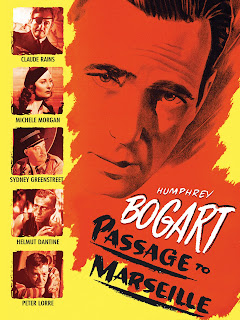





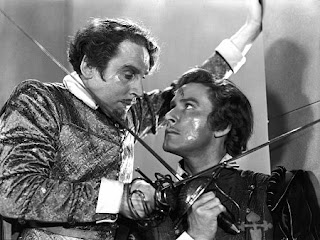
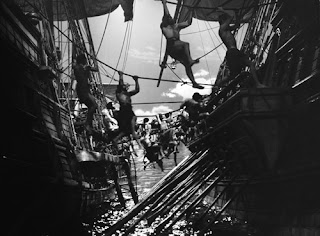




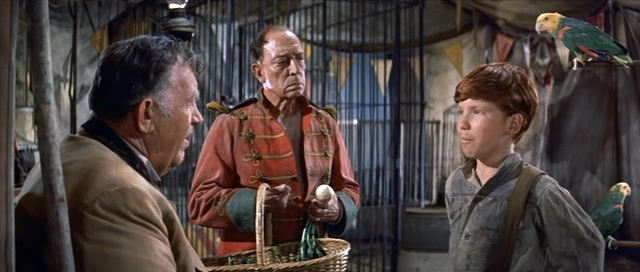

.jpg)

